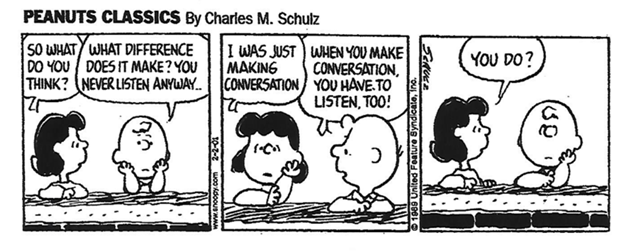The Princess who wanted the Moon

Long long ago, in a land far far away, lived a young princess.
One day the princess fell ill and told her father: “If I can have the moon, I will be well again”.
The worried king brought all the sages, wizards, and scientists, and they all debated and argued for hours on end, proving, again and again, their wondrous and endless wisdom. Yet, none of them knew how to bring down the moon for the princess, for it was so far and so heavy and so big.
After attentively listening to the sage’s arguments, the court jester silently slipped out of the room and went to see the princess. He quietly went into her room as she was laying on her gigantic white bed. He sat next to her, and held her hand. “My dear princess,” said the Jester, tell me more about this moon you so long for.” The princess was so happy to find someone who cared about her needs and enthusiastically shared her dream and her wish of the moon she so desired. After listening for a long while, the Jester asked: “My dear princess, what is the size of the moon?” “When I look at the moon, I can hide it with my fingernail, so it must be smaller than the tip of my finger,” she said. “And how far is it?” asked the Jester, “When I look at the trees, I see that it is sometimes trapped in their branches, so it must be as high in the sky as the trees.”, “and what is it made of? ” asked the Jester, “Gold, of course,” laughed the princess. “Then,” said the Jester, “I will bring you the moon by tomorrow morning.”
The next morning the young princess was beside herself with joy as she woke up to find a beautiful round medallion, smaller than her fingertip, and made entirely of gold next to her bed. She finally got her moon!
Sometimes, we are so sure we know what others need and want that we don’t even bother to ask.
Sometimes, we become angry because people are asking for things that we believe we can not give.
Sometimes, we really want to help, but we just don’t know how.
Sometimes, all we need to do is ask.
Sometimes, all it takes is to be open.
And sometimes, all we need is simply to listen.
The transformative power of attentive listening
While managers can gain many advantages from listening attentively to their employees (e.g., increased trust, gathering valuable information, reduced conflict, and induced motivation and commitment from employees, just to name a few), research shows that most managers are not attentively listening most of the time. A study of 8000 participants showed that most people believe they are above average listeners1 and a recent research2 of 3600 participants found that 96% of the participants thought they were good listeners. Yet studies3 show that on average, we retain only 25% of what we hear, and technology just makes listening harder2.
Moreover, the true power of listening, as the story of “the Princess who wanted the moon” so vividly demonstrates, is not merely about using our hearing faculties to collect and retain information for an extended period of time. It is about creating an environment where the speaker can receive a sense of openness and belonging that can actually transform who they are and how they feel.
Can Attentive Listening really help us change?
A recent study4 tested this assumption by randomly pairing participants to attentive listeners and poor listeners. It turns out that attentive listening does change the way we perceive ourselves and the world. Participants who shared a problem with an attentive-listening partner were found to feel more relaxed and less anxious. They felt encouraged to share their ideas with others and were able to articulate their problem more clearly. After being listened to, the participants felt less defensive and more aware of their weaknesses and strengths. They also exhibited a broader and more complex perspective of their problem and a less extreme and one-sided approach to possible solutions.
So why don’t we listen attentively?
1. It’s plain hard
We have to admit the hard fact, attentive listening is hard. From a young age, we were brought up to be right, to win, to have the correct answer and opinions, and most of us have never been actually trained to listen.
When you believe you already understand or have the answer, the brain quickly disengages and wonders off moving away from the state of attentive listening, even if outwardly, you remain quiet.

2. It’s time-consuming
Telling people what they should do is easy and quick; listening attentively is not. During times when we are all overworked and overloaded, attentive listeners become a rare commodity.
3. It’s a question of power
Leaders talk, subordinates listen. Strong dominating managers tend to be decisive and hold strong opinions and control. Yet, when we listen, we need to give some of that control to the speaker, thus yielding some of our own power and authority. Research suggest7 that there is actually a trade-off and although managers that listen may be perceived as less powerful, they gain, in turn, a higher level of admiration and prestige from their employees.
4. It’s because of technology
Technology weakens attentive listening. Research2 shows that 98% of participants multitask at work, and 64% claim that listening becomes significantly more difficult in today’s digital workplace. One research8 actually demonstrated that the mere presence of the participant’s smartphone in close proximity impairs available cognitive capacity even if no calls or messages come through.
So, what can we do as managers to improve our attentive listening capabilities? Here are a few tips:
Improving your attentive listening capabilities
1. Small steps go a long way
Contrary to common belief, listening attentively to someone, even for a short period of time, can make a whole lot of difference. If you are present, open, and curious, a quick check-in can go a long way. A survey of 1000 participants5 showed that managers and colleagues who listened attentively, even for short periods of time while checking-in on their employees and peers, induced a feeling of deeper belonging in the workplace. This feeling of belonging has been shown to increases job performance (by 56%6) and employee’s willingness to contribute (3.5 times more likely to contribute to their fullest potential6).
2. Be present, make it count
A high-level manager in a large multi-national company received this comment on his 360 prior to our workshop: “I need my manager’s help, but he is so busy that he is hardly ever there, it’s not enough bringing your body to a meeting, you need to actually be present!” (ouch…). After going through the workshop, he added a new ritual to his workday, he started checking-in with his employees by merely asking them: “How can I support you?” and simply listening. In a follow-up session, he shared with the group:” I couldn’t believe how such a simple question, and then silence and listening could make such a huge difference. Once the team felt I was really present, I was able to help them with issues that blocked them from doing their job in the last 4 years.”
3. Stop talking! (but don’t be silent either)
When you are listening, don’t interrupt, give advice, find solutions, or give feedback. Just listen.
But attentive listening is not about silently nodding your head and making “mmm” noises while your partner speaks. In a survey of 3,492 participants9, the people that were ranked as the best listeners were those that asked good supporting questions that conveyed a sense of safety and openness as well as trust in the speaker’s abilities to solve the problem.
Interestingly, people that ranked high on listening skills did give feedback and advice but only after creating a safe rapport by listening attentively for an extended period of time.
“When you really listen to another person from their point of view and reflect back to them that understanding, it’s like giving them emotional oxygen.” – Stephen Covey
4. Use technology, don’t let it abuse you
While technology can impede our ability to listen attentively, it could also be a great resource, especially in times of Covid-19 and social distancing. I have recently noticed that when done correctly, managers I work with have been very successful in creating heart to heart meaningful conversations using virtual one-on-one meetings without ever leaving their offices.
5. Don’t forget the little princess
The next time you are meeting an employee that is struggling or a colleague that is stuck with a problem, instead of immediately telling them what to do, giving them advice or going into feedback mode. Remember the little princess and listen attentively.
Chances are, you may actually have a better shot of helping them find their moon.
References:
-
-
- Haney, W. V. (1979). Communication and interpersonal relations. Homewood, IL: Irwin.
- Accenture: #ListenLearnLead Global Research 2015. Retrieved 12.8.2020 from: website link
- Husman, R. C., Lahiff, J. M., & Penrose, J. M. (1988). Business communication: Strategies and skills. Chicago: Dryden Press.
- Itzchakov, G., DeMarree, K. G., Kluger, A. N., & Turjeman-Levi, Y. (2018). The listener sets the tone: High-quality listening increases attitude clarity and behavior-intention consequences. Personality and Social Psychology Bulletin, 44(5), 762-778.
- Twaronite, K. (2019). The surprising power of simply asking coworkers how they’re doing. Harvard Business Review.
- Carr et al. (2019). The Value of Belonging at Work. Harvard Business Review.
- Hurwitz, A., & Kluger, A. N. (2017, January). The power of listeners: How listeners transform status and co-create power. In 77th Annual Meeting of the Academy of Management, Atlanta, GA.
- Ward, A. F., Duke, K., Gneezy, A., & Bos, M. W. (2017). Brain drain: The mere presence of one’s own smartphone reduces available cognitive capacity. Journal of the Association for Consumer Research, 2(2), 140-154.
- Zenger, J., & Folkman, J. (2016). What great listeners actually do. Harvard Business Review, 14.
-
This Article was originally posted here







